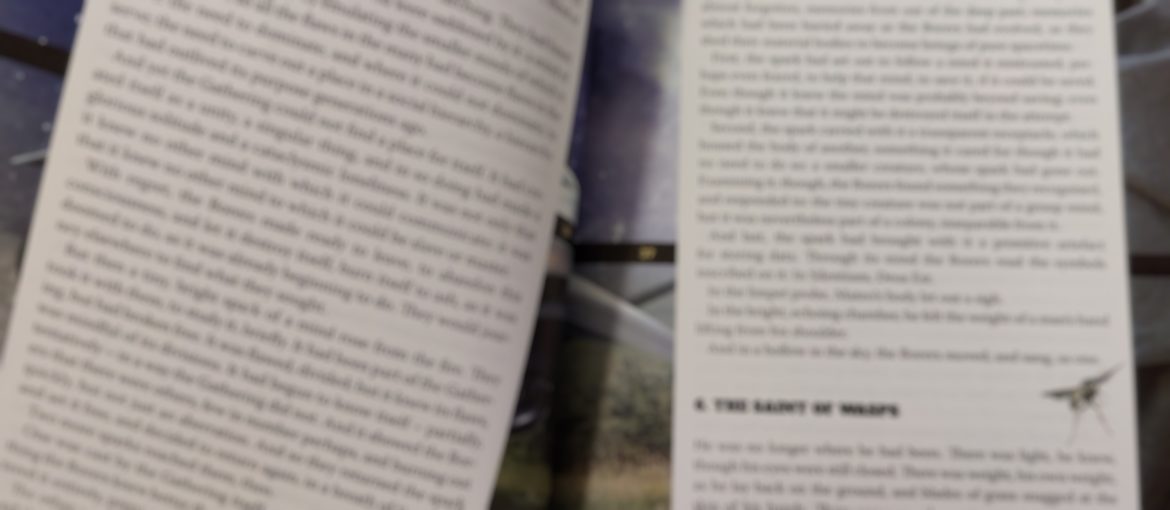Verum, Storm Humbert. The black market narcotic of choice is “verum”, a tailor-made substance that induces dreams in the user. Our protagonist is a mixer of verum, and indeed the first who produced mixes that induced dreams greater than the unimaginative output of the “porn barons” his product displaced. But this mixer is growing old and feels a younger competitor nipping at his heels. This is a solid lead story that focuses on the relationship between the two mixers, their experiences and desires, and the lurking threat of betrayal and violated trust. The worldbuilding is just enough though it’s unclear why verum is a black market substance, save that the story demands low-output mixers who tailor their product for individuals.
Can You Tell Me How to Get to Apocalypse?, Erica L. Satifka. A striking opening, featuring a bunch of dead kids performing for what seems like a morning kids’ TV show. We soon learn that the show is largely watched by adults and that these dead kids, deceased parodies of life as they are, are some of the only kids left. This tale of a twisted Sesame Street portrays characters who are reacting to the end of children and the imminent decline of humanity in different ways – but one common element is the retreat into the past, nostalgia and innocence that the TV show represents, for all that it is made possible by animating dead children. What price the comfort of nostalgia?
The Frog’s Prince; or, Iron Henry, N.A. Sulway. Not being familiar with the particularities of Grimm fairytales I’m only superficially aware of how this story reworks its originating material, but there is a queer element to the story that is sweet if underdeveloped, and the sexual fluidity is interesting if sidestepped (by amnesia!). To be honest, whilst the central relationship is kind and tragic in equal measure, most of the time whilst reading this I was just thinking about the witch who cursed the frog’s lover. Cursing three generations to self-destruction over their inability to father daughters is a disproportionate response to a refused request to get you a bucket of water from the well you’re sat right next to. Lazy bloody witches, eh?
The Princess of Solomon Pond Mall, Timothy Mudie. Short story about a lonely little girl who lives alone in an abandoned mall, and is sent a robot to keep her company. Her situation only becomes more tragic when you discover why she is alone, and who is sending her things. Somehow she makes living, organic beings – squirrels, her Nana, and every human being who was in the mall – disappear from existence. The story sees her beginning to forge a relationship with the robot and slowly sharing more of her story, amidst fears that she might also make her new companion vanish. The story works as it is but I would honestly have liked to read more: where that relationship goes and what happens; the mystery of the disappearances; the ambitions of her distant keepers.
Heaven Looks Down on the Tomb, Gregor Hartmann. A group of scientists drawn from the Lunar colonies visits Earth in search of data and, well, gut bacteria. Among them are a dozen grad students, who are essentially scientific mules for the latter. Mei is the foremost among these ‘Collectors’ but her position does not afford her much respect from Dr. Wong, the tyrannical head of the expedition, or authority among her peers. When Mei hears that there may be problems concerning the expedition back home, she needs to work with the limitations of her position for the best interests of the Collectors and the expedition’s objectives. A solid story, nicely told, with an open-ended conclusion.
FiGen, A Love Story, Kristi DeMeester. What if you could know the chances of your partner committing acts of infidelity through cheap genetic analysis? What if your marriage felt like it was in a downwards spiral of growing detachment and disinterest? And what might happen if you could know who the most likely object of your partner’s infidelity might be? FiGen runs with these questions, skirting the most obvious story beats and twisting the tale’s direction someone more interesting – and, ultimately, cathartic.

